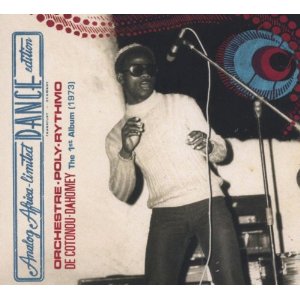While Strut continue to revive the career of these forgotten West African heavyweights with a killer new studio LP, Samy Ben Redjeb’s great archive label take us back to 1973 for Orchestre Poly-Rythmo’s stunning debut LP.
Founded by bandleader Malome Clement in the Benin coastal town of Cotonou in 1966 as Orchestre Poly-Disco, the band served up a heavy fusion of voodoo infused Afro-beat that, while indebted to their spiritual mentor Fela Kuti, provided Benin’s residents with their own modernist soundtrack. Heavily infused with the ancient sacred rhythms that had maintained the Benin people’s links to their Dahomey roots through years of colonial rule, this new music also drew on the youthful sounds emerging from both the Latin and African American diaspora.
It was a time of change both politically and culturally across West Africa and the psychedelic funk of the band perfectly suited the urgency and optimism of the times. During the late 60s, Benin produced a whole host of young wide-eyed bands (check Analog Africa’s previous compilation African Scream Contest) dreaming of success but mostly destined to play scruffy bars and clubs. One such band was Daho Jazz, whose singer Vincent Ahehehinnou was lured into OPR by band members Bentho Gustave and Bernard ‘Papignon’ Zoundegnon, who were desperate to find a soul singer to compare with heroes like James Brown and Fela. It was a wise move as the singer would not only provide them with an incredible soulful voice but also become their lead songwriter until his departure in 1978.
While Benin at the turn of the 70s had more than enough bands to constitute a healthy scene, without a sponsor the economic realities meant music was always going to be a sideline for most young groups. Similarly, unless you could make it to the premier studios of Lagos in neighbouring Nigeria your chances of making a name for yourself outside of Benin were limited. Orchestre Poly-Rythmo’s fortunes changed on both counts when local businessman and owner of the Albarika Record Store and associated label, Adissa Seidou took the band under his wing. After recording a 45 on Albarika the band set their sights further afield, and thanks to the financing and cross border contacts of Adissa found themselves in the same EMI studios in Lagos where Fela recorded so many of his groundbreaking LPs. And it was to these recordings that the band looked as they strove to release an LP of their own, realizing that a constant stream of 45s would only speak to their local fans in Benin.
Listening back now to the debut LP of a band that have finally found an audience beyond West Africa, it’s hard to believe that someone in Europe did not see the commercial potential of the group before labels like Analog Africa and Soundway revived their back catalogue. Consisting of four Vincent Ahehehinnou’s compositions the LP exudes the rawness of their early recordings, but there was a new depth and texture here that resulted both from the better-equipped studio and a band that recognized their pan-African potential that would see them have hits across West Africa.
It’s hard to know exactly how much influence Fela Kuti had on this recording although we do know that he hung out in the studio with the band during some of their sessions in the 70s, but one thing is clear and that is that Ahehehinnou had by now become an expert on Afrobeat, viewing Fela as a spiritual as well as a political guide. The influence is evident in the storming opener ‘Ou C’est Lui Ou C’est Moi’ with the locked guitar and fat bass groove of "Papillon" and Gustave and screeching JB style horns providing a militant foundation for Vincent’s raw but soul drenched vocal. But listen deeper and there’s a much spacier ‘out there’ sound that stands this group apart from their Nigerian and Ghanaian contemporaries. While that to some extent comes from the distinctive praise like vocal of Vincent and the psych-rock organ that reverberates throughout the LP, it owes its greatest debt to the incredible drumming of Yehoussi Leopold whose polyrhythmic dexterity stands him next to titans like Tony Allen as one of Africa’s greatest trap drummers. Add to this the metallic percussion of Amenoudji Joseph and you can here how the Vodoun Effect (as one of their previous Analog Africa LPs was named) was at work throughout their recordings. By the time you’ve lost yourself in the transcendental rhythmic assault of the 12 minute long ‘La La La La’ you can understand why the band used to preface their name with the initials T.P. for tout puissant — or "all-powerful". Heavy music for the head and feet.


